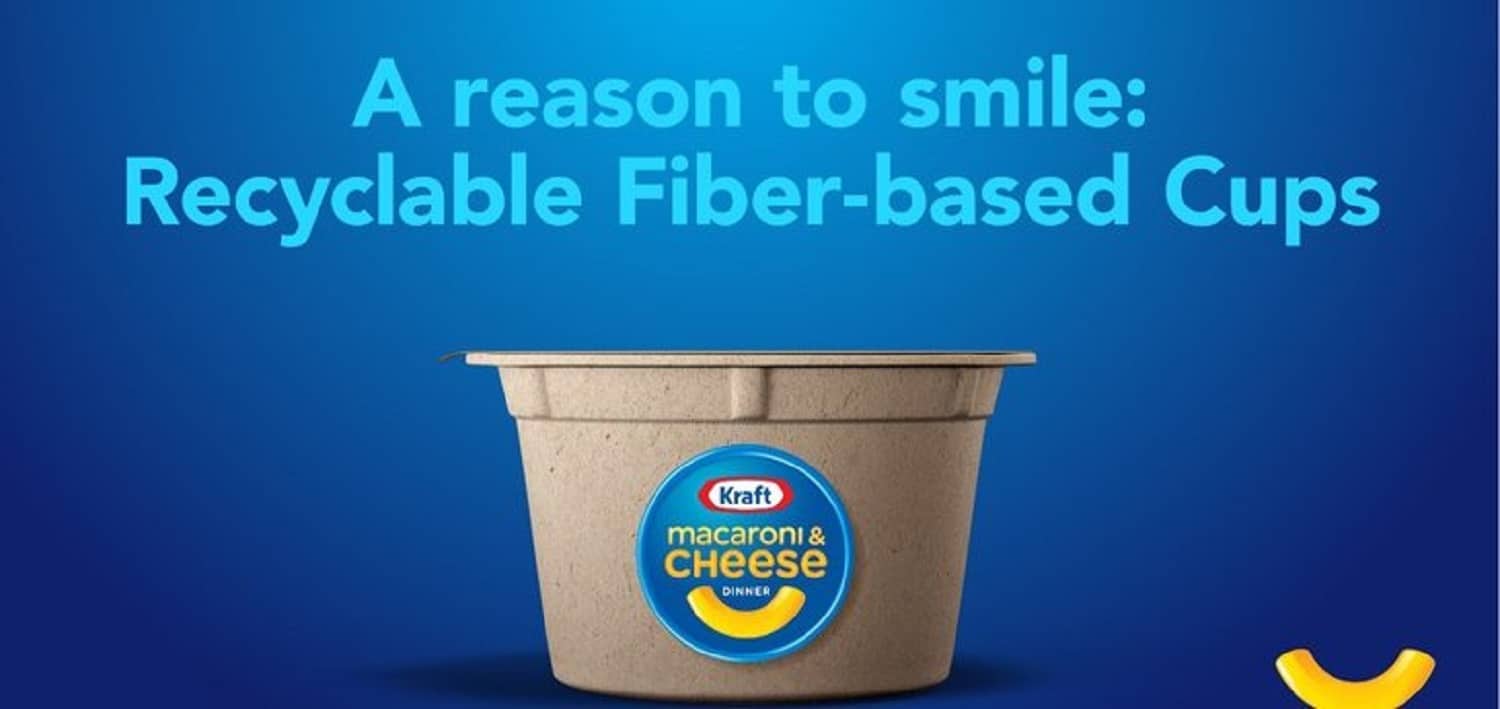Dive Brief:
- Kraft Heinz is testing a recyclable paperboard cup for its microwaveable Kraft Macaroni & Cheese product, the company announced. This would be the brand’s first recyclable cup. A new Macaroni & Cheese Shapes variety will be launched using this packaging later this year.
- The cup will not have a plastic label on it so that the package is both recyclable and compostable in industrial facilities. Kraft Heinz said the company is working on appropriate labeling to ensure consumers know to recycle the package when they are finished.
- This new package helps Kraft Heinz meet its sustainability goals, which include making 100% recyclable, reusable or compostable packaging by 2025. Many other food and beverage manufacturers are working to make their packaging more sustainable. Mondelez, Nestlé, Unilever and PepsiCo all have similar goals.
Dive Insight:
Kraft Heinz is entering the race to make convenience packaging more sustainable by launching one of Big Food’s first fully recyclable and compostable paper packages.
This is no easy feat. Food companies have had a difficult time finding inexpensive alternatives to plastic that can handle temperature changes, moisture and keep products inside fresh. It’s unclear from the press release how well these new Mac & Cheese cups can withstand those challenges. The release also doesn’t indicate whether the new cups are more expensive, though sustainable packaging companies have said a truly environmentally friendly package tends to cost about 25% more.
What is clear is Kraft Heinz is truly demonstrating its commitment to sustainable packaging with this test. While the company may have quietly been making aspects of its other product packaging more sustainable, the first big packaging change comes to one of its signature products.
Sustainable packaging is something consumers want to see, especially during the pandemic. In September, Schorr Packaging released a report that said seven in 10 consumers found food packaging important, and 58% would be likely to buy a product that clearly stated the packaging was reusable or recyclable. According to Nielsen’s 2015 Global Corporate Responsibility Report, two thirds of consumers would be willing to pay more for sustainable brands.
Despite its ambitious sustainability target, consumers and activists have been zeroing in on Kraft Heinz to improve its packaging. In November, environmental and corporate responsibility shareholder advocacy group As You Sow filed a petition asking the company to issue a report on its plastic use at the end of the year. Kraft Heinz, the shareholders group wrote, has no goals for amounts of recycled plastic to use or for plastic reduction.
While Kraft Heinz was likely working on this packaging before As You Sow’s shareholder petition, the new packaging can serve as a response. It’s proof the company is doing something to reduce plastic, even if it isn’t a pledge to use recycled materials or a clear metric on plastic reduction.
Other CPG companies are taking similar steps. Last year, Nestlé said it would spend as much as $2.1 billion to shift from virgin plastics to food-grade recycled plastics, committing $1.6 billion to pay a premium for recycled materials, and investing $260 million in packaging startups.
Beverage companies, which often rely on plastic and glass bottling, also have announced their intentions to trial paper bottles. In 2019, Danish brewer Carlsberg announced a prototype of a recyclable wood fiber based beer bottle, though it isn’t in use yet.
In July, British sustainable packaging company Frugalpac announced the Frugal Bottle, a wine bottle made from 94% recycled paperboard. And weeks later, a sustainable packaging technology company launched by Diageo and venture management company Pilot Lite said it had created a 100% plastic-free and paper-based spirits bottle made entirely from sustainable wood. The bottle is slated to debut with Johnnie Walker scotch whisky this year.
These and other packaging innovations are likely to find their way to grocery and liquor store shelves as 2021 unfolds. Since sustainable packaging continues to be important to consumers, and so many big companies have made commitments to improve their packaging, it’s likely that even more will start testing some of their innovations.
While many of these changes are invisible to consumers — like small shifts in package size, lightening up components of jar lids, and integrating more recycled material into packages — the big package overhauls will attract the most attention. Even though it’s hard to say how well companies are meeting their commitments to sustainable packaging, replacing plastic with recyclable paper is one way to stand out with consumers.







